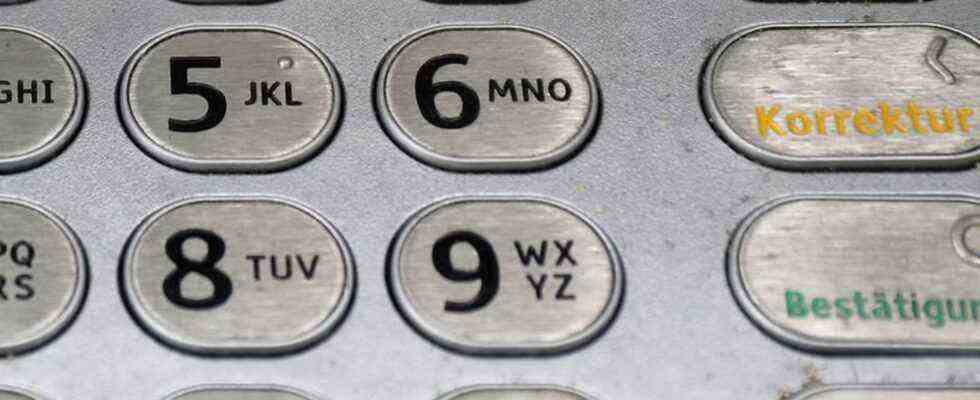banks
Hardly any data theft at ATMs
Damage caused by data theft from ATMs in Germany continued to decrease in 2021 and reached a low for the year as a whole. Photo: Oliver Berg/dpa
© dpa-infocom GmbH
Fewer cases, less damage: data theft at ATMs in Germany is becoming more and more obsolete. Elsewhere, criminals are now causing much greater damage.
Discontinued “skimming” model: The damage caused by data theft at ATMs in Germany continued to decrease in 2021 and reached a low for the year as a whole.
Euro Kartensysteme sums up the gross damage caused by so-called skimming attacks last year to 570,000 euros. The Frankfurt facility, which takes care of security management for payment cards on behalf of the German banking industry, said on request.
According to this, criminals manipulated ATMs nationwide 136 times last year in order to spy on bank customers’ card data and PIN. Individual machines may have been attacked several times. The English term «skimming» means «skim off» or «cream off».
Financial sector: Invest in security
In order to illegally obtain data from bank cards, criminals manipulate the slot on the ATM, for example – or they try to access the data via counterfeit door openers. Sometimes entering the PIN is also filmed with mini cameras or saved via a counterfeit keyboard attachment.
In 2020 there were 152 such “skimming” attacks on ATMs in Germany, the damage amounted to around 1.06 million euros. At its peak in 2011 and 2012 it was 34 million euros each.
The financial sector explains that skimming losses have been falling for years, primarily with the fact that significant investments have been made in security. Germany has relied on EMC technology for years. Payment cards are equipped with a kind of mini-computer, and the card is checked for authenticity each time it is used.
Banks get the money back
Because this technology is becoming increasingly popular around the world, criminals in Germany can only turn payment card data into money in very few countries – basically only where payment cards are equipped with easily copied magnetic strips and readers in shops are designed for magnetic strips.
Duplicate cards based on data stolen in this country were used last year primarily in the USA (50 percent of the damage), as well as in Brazil (32 percent) and India (10 percent). Because, thanks to international agreements, the countries with the lowest security standards have to pay for damage from fraudulent transactions with stolen card data, the local credit industry can recover almost the entire amount.
Major damage caused by passing on the PIN
Consumers in Germany who have become victims of skimming usually do not have to fear any financial disadvantage. As a rule, financial institutions compensate for such damage – provided the customers have handled their bank card and PIN carefully.
Far greater damage has been caused in Germany in recent years by theft or loss of payment cards. Euro card systems registered 13,968 (previous year: 10,839) cases in the year as a whole. The gross damage caused by the loss and theft of cards rose from a good 16.7 million euros in 2020 to around 18.2 million euros last year. Many consumers make it easy for criminals because, despite all the warnings, they keep their card and PIN together in their wallets.

